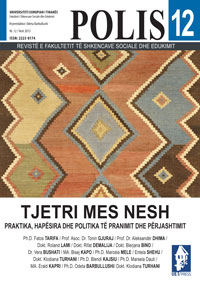Dialogu dhe kritika e lirë si emancipim shoqëror: ç’mësojmë nga Popper dhe Habermas?
Dialogue and Critique as a Means of Emancipation: what we can learn from Popper and Habermas
Author(s): Fatos Tarifa, Tonin GjurajSubject(s): Philosophy, Social Philosophy, Communication studies, Pragmatism, Philosophy of Science
Published by: Shtëpia botuese “UET Press”
Keywords: Jürgen Habermas; Karl Popper; philosophy; society; public sphere; communication; emancipation;
Summary/Abstract: While Popper’s and Habermas’ philosophies are often considered to be in irreconcilable conflict, essentially over issues in social science methodology and on political ideology, there are however elements that point to not only problems of mutual concern, but also to a number of shared values and assumptions, such as the value of freedom of speech and communication, which is central to both of them. For Popper, a key requirement of the open society is the freedom to criticize political and intellectual authority, while Habermas demonstrates the importance of open, undistorted communication. The main normative convergence of their thought can be found in Popper’s sketch of the “open society” and Habermas’s concept of an “ideal speech situation”. Both philosophers advocate a public sphere characterized by free dialogue and criticism set within a democratic context, although they use significantly different ways of argument to establish them. This paper aims to delineate the importance of Popper’s and Habermas’ ideas on the role that free and undistorted public debate could play for the emancipation of Albania’s intellectually acrimonious society.
Journal: Polis
- Issue Year: 2013
- Issue No: 12
- Page Range: 5-14
- Page Count: 10
- Language: Albanian

